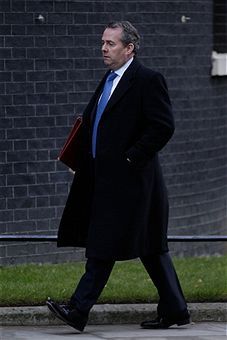 Yesterday, Liam Fox vowed to install a tougher procurement system in the Ministry of
Defence and appointed the bureaucracy-busting Bernard Grey as Chief of Defence Materiel. The
Defence Secretary said that it is important to start from first principles if reform is to take place. The ministry, he said, “exists to provide the Armed Forces with what they need”. But
is that right?
Yesterday, Liam Fox vowed to install a tougher procurement system in the Ministry of
Defence and appointed the bureaucracy-busting Bernard Grey as Chief of Defence Materiel. The
Defence Secretary said that it is important to start from first principles if reform is to take place. The ministry, he said, “exists to provide the Armed Forces with what they need”. But
is that right?
The MoD exists, first, to maintain civilian and democratic control of the armed forces; and, second, to support effective operations. Supporting the military is a corollary of the second task, but not the same thing. In desiring to reform the MoD and cut costs, there is a real risk the government loses some of the capabilities the department needs to deliver its core tasks.
The MoD’s first task is understood in theory but has been eroded in practice since the Brown/Dannatt spat a few years ago. It is, to quote Samuel P. Huntington’s seminal The Soldier and the State, to assist “the proper subordination of a competent, professional military to the ends of policy as determined by civilian authority”. But British military leaders bestride the scene in a way that politicians never could. Military chiefs hold forth on all manner of issues, many the preserve of politicians, and do not shirk to use the media in their efforts. The MoD, poorly led for years, and with a demoralised staff, has not been able to counterbalance the military chiefs while Ursula Brennan, the new Permanent Secretary, has yet to impress.
This is potentially a problematic development. During the Cold War, the MoD’s main job was to ensure any order for a nuclear attack was given by ministers not officers. Today, the MoD must similarly ensure that key decisions are made by civilian masters. It is up to politicians, not military leaders, to decide the length of Britain’ stay in Helmand or the potential impact of withdrawal on counter-terrorism operations in Pakistan. But the weakness of the MoD makes it more difficult for politicians to maintain control of the military and some even fear that military leadership will eventually come to dominate the NSC decision-making process.
The MoD’s second task – supporting operations not the operators – is not even understood in theory. There is an important if subtle distinction between supporting the military and supporting military operations. The best thing for the military may not necessarily mean giving them what they want. The key is to look at how best to achieve outcomes, i.e. successful operations, even if that means going against what the military leadership wants for itself. Here, again, politicians need to be helped by a well-led department.
Lest anyone think this is a defence of bureaucracy and waste, let me be clear: there have been woeful failings in the MoD that have to be corrected. The appointment of Bernard Grey is an important step, as are moves to reform the department. But in the current climate there is a real danger of emasculating the MoD (through cuts, poor bureaucratic leadership and a negative press campaign) to the degree that it will not be able to fulfil its core task, which is not buying what the military wants, but to maintain civilian and democratic control of the military.






Comments